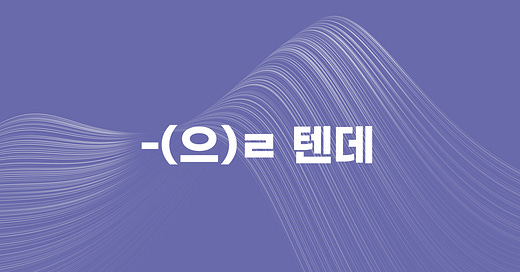Let's study about the Korean grammar expression "-(으)ㄹ 텐데" today. This expression is often used to express the speaker’s assumptions, expectations, or concerns about a situation. While similar to other grammatical forms that indicate assumption or expectation, "-(으)ㄹ 텐데" often suggests that the speaker has a strong basis for their prediction, like previous knowledge or logical inference.
Definition:
"-(으)ㄹ 텐데" combines the ending "-ㄹ/을 테-" (used for assumptions or expectations about future situations) with "-ㄴ데," which is often used to contrast or connect two related ideas. Together, it conveys the speaker’s assumption or prediction, usually followed by a contrasting or suggestive second clause.
Usage:
Expressing Assumptions/Expectations: The speaker expects something to happen, usually leading into a suggestion or contrasting idea.
Expressing Concern: The speaker may feel worried about a potential outcome and express that concern in the first clause.
How to Form:
For verb/adjective stems ending in a vowel: Attach "-ㄹ 텐데"
Example: 하다 (to do) → 할 텐데For verb/adjective stems ending in a consonant: Attach "-을 텐데"
Example: 먹다 (to eat) → 먹을 텐데
Examples:
Assumption or Expectation
날씨가 추울 텐데 따뜻하게 입으세요.
(The weather is probably cold, so dress warmly.)오늘은 길이 막힐 텐데 일찍 출발합시다.
(The roads will likely be crowded today, so let’s leave early.)
Concern or Potential Problem
시험이 어려울 텐데 열심히 공부하세요.
(The test might be difficult, so study hard.)사람들이 많이 올 텐데 자리가 부족할지도 몰라요.
(A lot of people might come, so there might not be enough seats.)
Similar Grammar Structures:
"-ㄹ 거예요": Used to express a softer assumption or expectation without the connection or concern aspect.
오늘 비가 올 거예요. (It will probably rain today.)
"-ㄹ까 봐": Used to express worry or concern about a future possibility.
비가 올까 봐 우산을 가져왔어요. (I brought an umbrella in case it rains.)
Considerations:
"-(으)ㄹ 텐데" often implies a certain tone of concern, and it’s commonly used to suggest actions that address an assumed or expected situation.
It’s often polite or thoughtful, as it allows the speaker to show awareness of a listener’s possible needs or situation.
Would you like to practice creating sentences using "-(으)ㄹ 텐데"?



